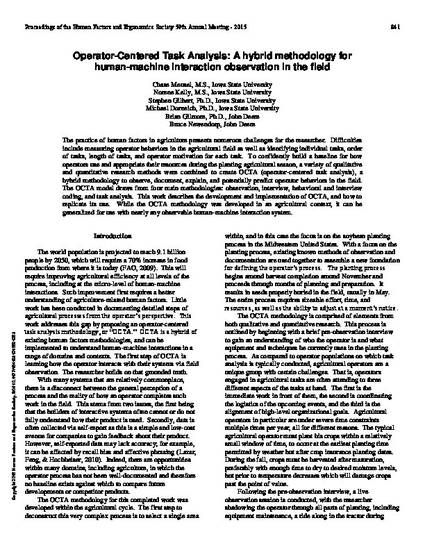
Presentation
Operator-Centered Task Analysis: A Hybrid Methodology for Human-Machine Interaction Observation in the Field
Human Factors and Ergonomics Society Annual Meeting
(2015)
Abstract
The practice of human factors in agriculture presents numerous challenges for the researcher. Difficulties include measuring operator behaviors in the agricultural field as well as identifying individual tasks, order of tasks, length of tasks, and operator motivation for each task. To confidently build a baseline for how operators use and appropriate their resources during the planting agricultural season, a variety of qualitative and quantitative research methods were combined to create OCTA (operator-centered task analysis), a hybrid methodology to observe, document, explain, and potentially predict operator behaviors in the field. The OCTA model draws from four main methodologies: observation, interview, behavioral and interview coding, and task analysis. This work describes the development and implementation of OCTA, and how to replicate its use. While the OCTA methodology was developed in an agricultural context, it can be generalized for use with nearly any observable human-machine interaction system.
Disciplines
Publication Date
September 1, 2015
Location
Los Angeles, CA
DOI
10.1177/1541931215591253
Comments
Copyright 2015 Human Factors and Ergonomics Society. Posted with permission.
Citation Information
Chase Meusel, Norene Kelly, Stephen B. Gilbert, Michael C. Dorneich, et al.. "Operator-Centered Task Analysis: A Hybrid Methodology for Human-Machine Interaction Observation in the Field" Human Factors and Ergonomics Society Annual Meeting (2015) Available at: http://works.bepress.com/stephen_b_gilbert/38/
